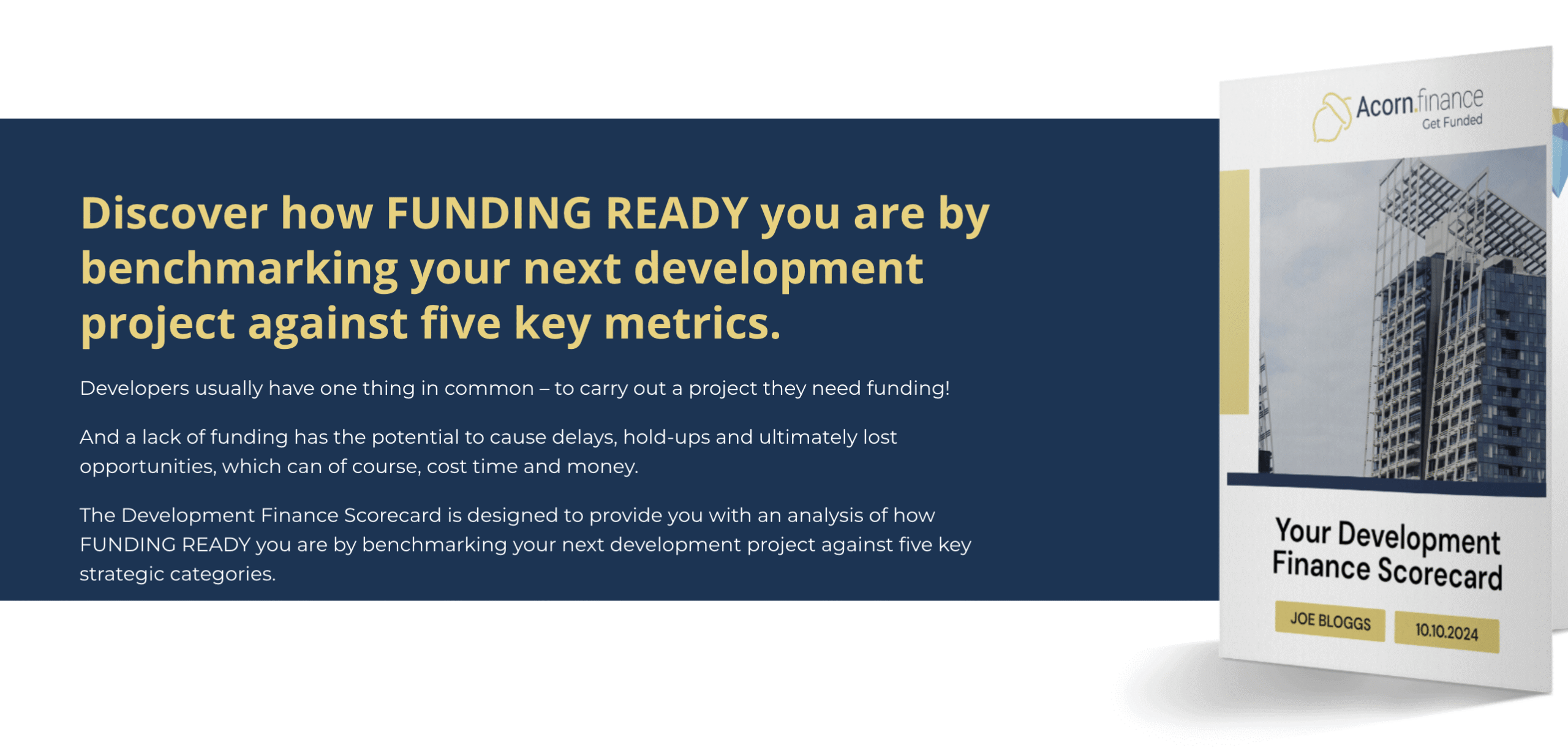The UK property development sector stands at an interesting juncture.
On the one hand, bolstered by the government’s continued push for increased housebuilding and ongoing efforts to streamline the often-complex planning application process, the potential for growth remains significant.
On the other hand, however, developers must also navigate a landscape shaped by evolving economic forecasts and persistent headwinds.
For those ready to make the most of these opportunities, securing the right property development finance is paramount. But how can developers ensure they are “finance ready” for their next project?

Are You Finance Ready? Your Property Development Finance Scorecard

With our Development Scorecard, developers can get a quick self-assessment of their finance readiness. This scorecard looks at key areas that lenders scrutinise, including project viability, experience, financial standing, and the strength of your development plan. Understanding your strengths and weaknesses in these areas is the crucial first step towards securing the necessary funding.
Key Factors for Property Development Finance Readiness:
Beyond the scorecard, several factors will significantly influence your ability to obtain development finance:
A Detailed and Realistic Business Plan
Lenders want to see a comprehensive plan outlining your project, target market, sales strategy, and, most importantly, robust financial projections. This includes detailed cost breakdowns, realistic timelines, and sensitivity analysis for potential risks.
Sufficient Equity Contribution
Having “skin in the game” demonstrates your commitment and reduces the lender’s risk. The level of equity required will vary, but a strong contribution is always viewed favourably. Don’t forget though, if you have a strong proposition there are funding sources who may provide 100% funding for some equity (or a “slice of the action!”)
A Proven Track Record (or a Strong Team)
Lenders are more comfortable with developers who have a history of successful projects. If you’re newer to the scene, having an experienced team with a solid track record can significantly boost your application. Talk to our team and together we’ll get you the best option.
Thorough Due Diligence
Comprehensive site assessments, clear planning permissions, environmental reports, and a robust legal framework are essential to demonstrate a well-prepared project.
Looking Ahead: House Prices and Interest Rates
Forecasting house prices is never an exact science, but current predictions suggest a period of more moderate growth following recent fluctuations. While some analysts anticipate a gentle upward trend driven by ongoing demand and limited supply, significant booms are less likely in the near term. This necessitates careful market research to ensure your development aligns with local demand and achievable sales prices.
On the interest rate front, while the UK has experienced a period of higher rates, many economists predict potential reductions in the coming years as inflation eases. This could positively impact the cost of borrowing for development finance, making projects more viable. However, the timing and extent of these reductions remain uncertain, so factoring in some level of interest rate volatility in your financial models is prudent.
Being reliant on economic tail winds is generally a sign of a poor proposition and will not get past the first stages of financial due diligence!
Navigating the Headwinds: Material Costs and Wage Inflation
The property development sector has faced significant challenges with rising material costs and wage inflation. While these headwinds persist, there are strategies to mitigate their impact:
Early Procurement and Fixed-Price Contracts
Securing material supplies early and negotiating fixed-price contracts with reliable contractors can help to control costs. Phased Development: Breaking down large projects into smaller, manageable phases can provide more flexibility in responding to market fluctuations. Skilled Project Management: Efficient project management is crucial to minimise delays and associated costs.
Quality Design & Value Engineering
Exploring cost-effective alternative materials and construction methods without compromising quality can help manage budgets.
Phased Development
Breaking down large projects into smaller, manageable phases can provide more flexibility in responding to market fluctuations.
Skilled Project Management
Efficient project management is crucial to minimise delays and associated costs.

Opportunity Knocks for the Prepared!
Despite the evolving economic landscape and ongoing cost pressures, the government’s commitment to housebuilding presents a significant opportunity for well-prepared property developers.
By focusing on robust planning, demonstrating finance readiness (utilising tools like the acrn.co/devscore scorecard), conducting thorough market research, and proactively mitigating potential headwinds, developers can position themselves to thrive in the current market and contribute to the UK’s housing goals.
The key is to be informed, adaptable, and meticulously prepared for every stage of the development journey.